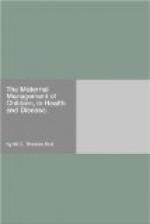But how, then, is a good carriage to be obtained; which is not only pleasing to the eye, but is, when natural, absolutely conducive itself to health? To insure a good carriage, the only rational way is to give the necessary power, especially to the muscles chiefly concerned; and this is to be done, not by wearying those muscles by continual and unrelieved exertion, but by invigorating the frame generally, and more especially by strengthening the particular muscles through varied exercise alternated with due repose. Attention to general health, suitable diet, regular bowels, moderate but regular exercise, not of particular muscles only, but of the whole frame, cold-bathing or sponging, and other such measures, will maintain a good carriage, by giving that power which the more direct means so generally practised serve but to exhaust.[FN#18]
[FN#18] The above remarks on “good carriage” are almost wholly taken from a valuable article of Dr. Barlow’s, in the “Cyclopaedia of Practical Medicine.”
Chap. II.
ON THE USE AND ABUSE OF CERTAIN REMEDIES.
Sect. I.—Aperient medicine.
One of the greatest errors of the nursery is the too frequent and indiscriminate exhibition by the mother or nurse of purgative medicine to the infant. Various are the forms in which it is given; perhaps the little powders obtained from the chemist is the most frequent, as it is certainly the most injurious, form, their chief ingredient being calomel.
The choice of the aperient, or the dose, or the exact condition of the health of the infant, or whether it is an aperient at all that is required, are points entirely overlooked: a little medicine is thought necessary, because the child appears unwell, and a purgative, or a little white powder, is forthwith given. The great art of medicine is the proper application of the proper medicine, in the proper dose, at the proper time; points never considered in the nursery. For example, I have known a large dose of magnesia given by a nurse to an infant, that had been suffering from a diarrhoea of some days’ standing, and very quickly cause death. Now, magnesia is one of the most useful and harmless medicines that can be given to an infant when indicated; when prescribed in a dose suited to its age, and when the proper time is fixed upon for its exhibition; in the foregoing case, however, every thing forbad its use, but none of these points were considered.
Aperient medicine, too, is sometimes unwittingly repeated to remove those symptoms which it has itself produced. Some incidental pain and uneasiness, some slightly greenish appearance of the motions, leads the mother to believe that more purging is necessary, when, in fact, both circumstances have probably been induced by the irritation caused by the purgatives already too freely administered. How frequently is this the case, during the first week or ten days of the infant’s life, when the nurse doses the child with tea-spoonful after tea-spoonful of castor oil, for the relief of pain, which her repeated doses of medicine have alone created.




